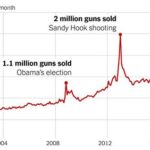‘It is instructive to notice the description of the guns confiscated by the city, even though none of them had been implicated in any criminal activity, as “low hanging fruit”. None of them were illegal to own under California law. There is an entire philosophy attached to that phrase. If the guns should not be returned because they are “low hanging fruit”, the point is that gun ownership, no matter if legal, is bad. Any way to diminish gun ownership, not matter how unjust, or ineffective, is good. The court is making a specific value judgement, rather than a legal one. It does not like legal gun ownership, so it will penalize legal gun owners whenever it can take “low hanging fruit”.’
U.S.A. –-(Ammoland.com)- In January, 2013, after a 911 call, a police officer of the City of San Jose seized 12 firearms from the home of Edward and Lori Rodriquez in the City of San Jose, California. No warrant was applied for. The officer claimed knowledge that there were firearms in the house. The firearms were removed under protest, even though one of the firearms completely belonged to and was registered to Lori Rodriquez, who remained in the home.
Edward was involuntarily admitted as a danger to himself and others, and lost his Second Amendment right to keep and bear arms, for a minimum of five years under California law.
None of the 12 firearms were illegal to own under California law. The City of San Jose asked for a forfeiture order for the firearms from the local court, which was granted.
Lori went through the legal hoops necessary to have the firearms returned to her legal possession.
The city refused to return those firearms. The California Superior Court and Court of Appeals agreed with the city. The argument appears to be the City was under no obligation to return this property, even though there was a legal property right and the property was not contraband.
By



